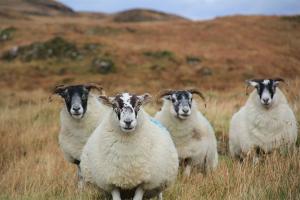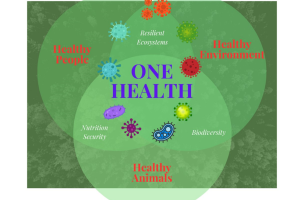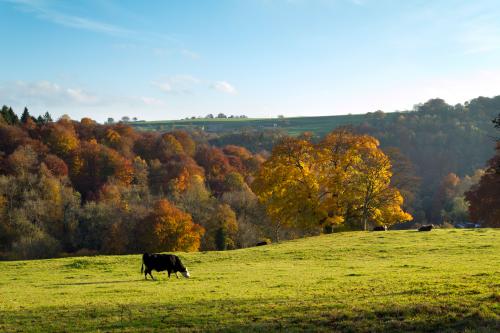
SEFARI provides the research needed to improve the efficiency and resilience of Scotland’s food production systems whilst protecting the environment and our rural communities. SEFARI works on improving our crop production systems, and reducing the impacts of plant disease. For livestock, work on animal characteristics and health and welfare leads to more efficient livestock production, which in turn reduces waste, lowers greenhouse gas emissions and improves global food security.
Sector Contact

Case Studies
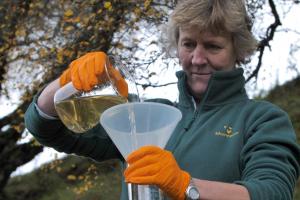
The protozoan parasite Cryptosporidium is a significant cause of diarrhoeal disease in humans and animals in UK and many other countries across the world. Cryptosporidium are highly successful parasites as they can infect many different hosts, multiplying in the gut and then shedding millions of parasite oocysts (eggs) in the faeces, where they can contaminate the environment and are a source of infection for other hosts.
SEFARI research is increasing our understanding of the sources of Cryptosporidium parasites, and the transfer of oocysts from host faecal material through the environment to water courses. This work will help with developing strategies to protect water catchments.
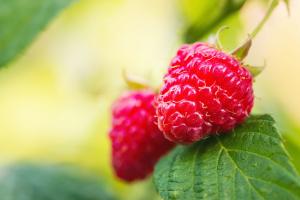
The production of soft fruit is an important commercial activity in Scotland, generating more than £115 million in income for growers in 2018. This industry is underpinned by the national (UK) collection of high health raspberry and blackcurrant varieties. These collections are propagated in biosecure glasshouses and are tested annually to guarantee that they are free from infection by particular pests and pathogens. Viruses are a major cause of disease of soft fruit plants growing in the field. In this post, we will give you a short overview of some of the research aiming to properly characterise these viruses and so develop more and better diagnostic tests that we can apply to the high health collections.

The past year has been, and 2021 will undoubtedly remain, challenging for us all. At Gateway we are focussing our efforts on continuing to support the COVID-19 recovery response while maintaining momentum for knowledge exchange partnership working across environment, land, agriculture, food and rural community priorities.
In particular, we are building upon opportunities to accelerate action towards a green recovery, climate and biodiversity action and just transition for net zero emissions. Gateway is supporting these and other key agendas such as health and wellbeing, by providing extensive access to Scottish Government strategic research and expertise through our funded projects which we are also increasingly interlinking projects to maximise the value of evidence and to further enhance stakeholder linkages.
This update follows on from our previous update in June 2020 and outlines our more recent funded projects and activity.
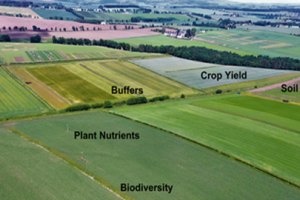
Currently, we are all experiencing unique working conditions, leading us to adapt to new ways of engaging and learning.
In this blog Dr Claire Hardy, who was awarded SEFARI Gateway Responsive Opportunity Funds, explores the use of virtual technology to engage farmers and the agricultural community, helping farmers to experience in-field events safely, flexibly, and remotely.
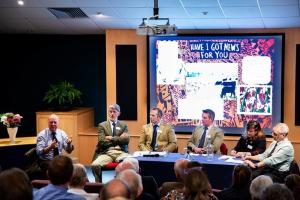
In this blog, we discuss a new project that is seeking to support and inform farmers (through both research and communications) on how to best promote fair, balanced, and more impactful, positive stories about the livestock industry.
Through a collaborative approach, we can increase public knowledge and understanding on how Scots beef and lamb is produced, leading to a wider and better understanding of the Scottish livestock industry, including the positive benefits of eating safe and nutritious food, alongside the environmental, social and economic benefits that livestock farming can bring.

Across SEFARI we are using our capability and continuing to make our expertise available to assist with national and regional strategies dealing with the COVID-19 pandemic. Our collective efforts have included loaning equipment, staff volunteering and adapting our research to help with understanding the impacts of the crisis.
In addition, colleagues at Moredun and Scotland's Rural College (SRUC) Veterinary Services have been working hard to support the NHS by providing extra capacity for testing to help tackle the pandemic, which is the focus of this blog.

In this blog, we thought we’d let you know the latest developments from SEFARI Gateway, as we continue to work together even though we are currently physically apart.
For us, lockdown has really emphasized our love of nature (on daily walks, in the garden or by virtually meeting each other’s pets, now so much a part of the virtual meeting world!). Gateway’s work itself has been intensive. The strengths of our stakeholder partnerships and an adaptable approach to connecting across knowledge networks has hugely benefitted us and provided new ways to work.
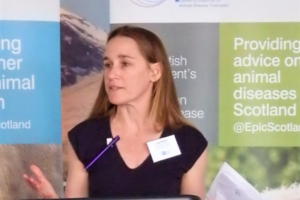
The UK government stated strategy is to manage the COVID-19 pandemic “led by the science”. However, calls for more transparency about what this really means are getting louder.
Mathematical models and simulations are driving the world’s response to COVID-19. Epidemiological modelling is by no means the only source of intelligence that politicians are taking into account when decision-making about our health, but articles like these: “Behind the Virus Report That Jarred the U.S. and the U.K. to Action” and “The battle at the heart of British science over coronavirus” make it particularly eye-catching.
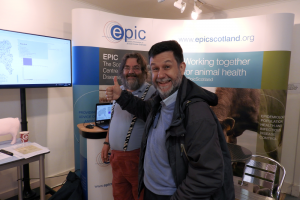
In a previous blog article we described the development of the Cowtastrophy web app which was funded by the SEFARI Gateway’s Responsive Opportunity Fund. The main aim of the app is to communicate some of the key concepts which drive livestock disease control policies to a non-scientific audience. In particular, we see the app as a tool to support knowledge exchange at public events.
The Cowtastrophy web app was developed with helpful input from EPIC (the Scottish Government-funded Centre of Expertise in Animal Disease Outbreaks) and we were delighted to be able to present Cowtastrophy as part of EPIC activities at the Royal Highland Show in June this year. We were able to talk to plenty of visitors and use the app as part of an informal, but structured process to support learning.
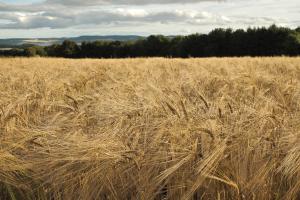
We are pleased that Bob Rees, Scotland’s Rural College is able discuss reducing greenhouse gas emissions from cropping systems. This post was originally published by the Scottish Parliament’s Information Centre (SPICe), who commissioned SEFARI to write a series of blogs to stimulate debate on this issue. SEFARI research takes a collaborative approach and looks at this complex and challenging issue from multiple perspectives, including improving animal health, the role of precision agriculture and changing dietary intake to reduce greenhouse gas emissions.
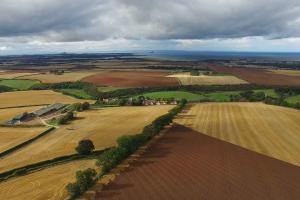
We are pleased that Andrew Barnes and Vera Eory, Scotland’s Rural College are able to discuss the role of precision agriculture in reducing greenhouse gas emissions. This post was originally published by the Scottish Parliament’s Information Centre (SPICe), who commissioned SEFARI to write a series of blogs to stimulate debate on this issue. SEFARI research takes a collaborative approach and looks at this complex and challenging issue from multiple perspectives, including improving animal health, changing dietary intake, and the role of cropping systems to reduce greenhouse gas emissions.
We are pleased that Jennie Macdiarmid, the Rowett Institute is able to discuss the links between what we eat and our climate change commitments. This post was originally published by the Scottish Parliament’s Information Centre (SPICe), who commissioned SEFARI to write a series of blogs to stimulate debate on this issue. SEFARI research takes a collaborative approach and looks at this complex and challenging issue from multiple perspectives, including improving animal health, as well as the role of precision agriculture and cropping systems in reducing greenhouse gas emissions.
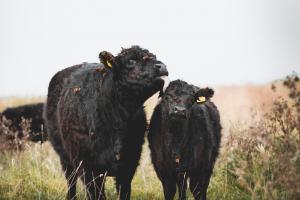
We are pleased that Philip Skuce, SEFARI Gateway and Moredun Research Institute and Michael MacLeod, Scotland’s Rural College are able to discuss how improving animal health can reduce the impact of livestock on climate change. This post was originally published by the Scottish Parliament’s Information Centre (SPICe), who commissioned SEFARI to write a series of blogs to stimulate debate on this issue. SEFARI research takes a collaborative approach and looks at this complex and challenging issue from multiple perspectives, including the role of precision agriculture, cropping systems and changing dietary intake to reduce greenhouse gas emissions.

We are pleased that Dr Katy Hayden, Plant Health Officer, Royal Botanic Garden Edinburgh (RBGE), can tell us more about a new interactive public exhibit on plant and animal biosecurity at the RBGE. Katy led a project team who were recently awarded SEFARI Gateway Responsive Opportunity Funds (ROF) to create this display.
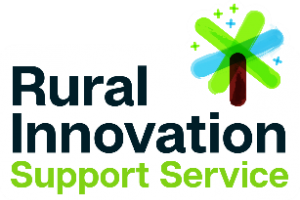
We are delighted that Megan Welford, Farming and Land Use Communications Manager, Rural Innovation Support Service (RISS), can tell us about this new service. RISS is getting the right people together to make a difference to rural businesses across Scotland and they’d like even more researchers to help by sharing their expertise.

Working in research we regularly need to focus on the detail, but it is still important to take a step back and look at the bigger picture - so for this year’s Royal Highland Show we decided to use technology to help.

We are pleased that Professor Ian Toth, Head of the Plant Health Centre, is able to tell us more about this new virtual centre and why working together is crucial for enhancing Scotland's resilience in the face of threats to arable crops, trees, horticulture, and wild plants. The Plant Health Centre joins three exisiting Scottish Centres of Expertise on climate, water and animal disease.
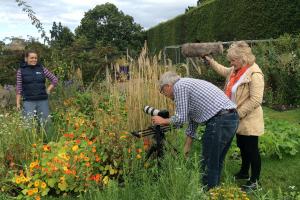
We are pleased that Annemarie Gibson of Circamedia, an Edinburgh-based film and multimedia production company, has provided us with some insights into what excited her whilst learning about SEFARI research and ultimately telling our story on film.
Pagination
Blog

Digging into the Problem: AMR in Agricultural Ecosystems
The use of antimicrobials in livestock farming has proven essential for maintaining animal health, but are known to contain resistant bacteria due to the use of antimicrobials in livestock.
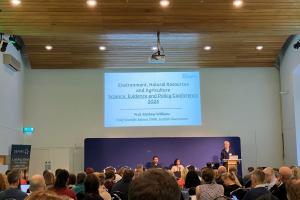
Following the success of the first ENRA Science, Evidence and Policy conference last year, the conference returned this year to provide a forum to discuss key cross cutting strategic issues affecting Scotland’s environment
